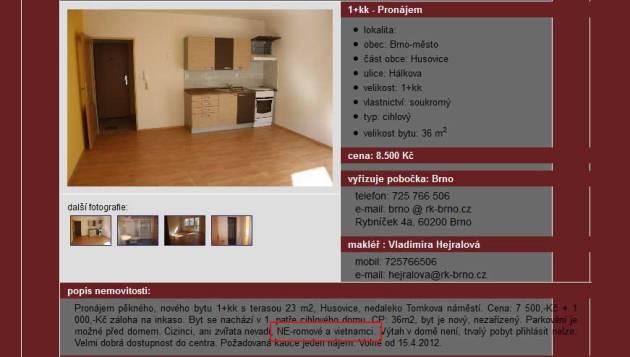Czech researchers find high levels of housing, job discrimination against minorities

In the Czech Republic, Romani and Vietnamese people must respond to twice as many advertisements for available apartments as Czech people in order to be invited to view a property. Czech job seekers also have more than a 180 % greater chance than Asian people of being invited for an interview by a prospective employer and 75 % more of a chance than Romani people.
Those are the results of an experiment performed by researchers with the Center for Economic Research and Graduate Education – Economics Institute (CERGE-EI) in the Czech Republic. They created three fictional apartment and job seekers – an Asian man, a Czech man and a Romani man – to respond to advertisements for apartments and jobs and then evaluate the reactions to each candidate from firms and property managers.
"We discovered a high level of discrimination against minorities on both the housing and labor markets," the authors of the report on the experiment say. In the scenario, the prospective tenants profiled themselves as 30 years old, unmarried, non-smokers with either high school or college educations, working full-time in retail and looking for a two-bedroom apartment.
The applicants were given the names Jiří Hájek (the Czech), Gejza Horváth (the Roma) and Phan Quyet Nguyen (the Vietnamese). The three prospective tenants responded by e-mail to 1 800 advertisements, mainly in Prague, posted by private landlords on the four main internet portals for real estate listings.
The text of the candidates’ first e-mail featured greetings and an expression of interest in a property. A follow-up e-mail included a link to the prospective tenants’ personal websites featuring information about their education, employment and family.
Hájek, the Czech candidate, was invited to view an apartment 78 % of the time, while the minority members were invited to do so only 41 % of the time. According to the authors of the research, the approach taken toward the Asian applicant was similar to the approach taken toward the Romani applicant.
"Minority house-hunters must respond to almost twice as many advertisements to get the same number of invitations to view a property as an applicant from the majority society," the authors of the research found. Less than half of the landlords who were contacted opened the link to the personal websites of the prospective tenants.
The websites of the minority applicants were scrutinized by 41 % of those who received a link, and they were also more likely to click through the sites for more information. Hájek’s website was viewed by 33 % of the landlords.
The research team also responded by e-mail to advertisements for jobs on the jobs.cz internet portal. Each of the candidates responded to 274 offers.
The profile of the candidates was that of a 23-year-old high school graduate with knowledge of English and computer skills, a driver’s license, and previous experience with administrative work. The candidates were looking for jobs in administration, customer service or retail.
Links to the candidates’ personal online profiles were included with the CVs they submitted. Hájek, the Czech candidate, got an answer from 43 % of the employers contacted and was invited for an interview by 14 % of those firms, while the minority candidates got responses from only 20 % of the businesses and were invited for an interview by only 6.2 % of them.
According to the results, prospective employers treated the job-seekers with the Asian name differently from the job-seeker with the Romani name. "Asian job-seekers have to send out 20 responses to get one interview, while Romani people have to send out 12.5 and people from the majority population only have to send out 7.5 %," the research authors reported.
According to their findings, a Czech job-seeker is 180 % more likely than one with an Asian name to be invited for an interview and 75 % more likely to be invited for an interview than one with a Romani name. According to this research, landlords looked for more information online about applicants who were "less attractive", while employers looked for more information about the "more attractive" applicants.